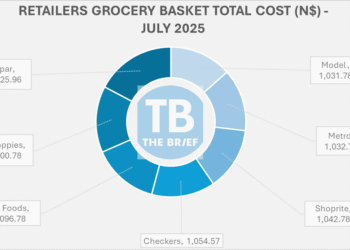
President Hage Geingob says Namibia will only work with investors who can operate locally with the view of exporting finished products as opposed to raw materials.
This comes after in June, the Namibian government banned the export of unprocessed lithium and critical minerals in a bid to encourage the development of more domestic processing.
“We have made it clear to these interested parties and potential others that Namibia will only do business with stakeholders who share its vision of local value addition to our minerals to produce finished products for export,” the President said at the ongoing 10th mining expo organised by the Chamber of Mines, in a speech read by Vice President Nangolo Mbumba.
“We have learnt valuable lessons from history that nations which export their products in unprocessed forms at cheaper prices and buy back finished products at higher prices are not able to develop their economies to the extent required for shared wealth and development among their citizens,” Geingob added.
Geingob further said the decision to ban the export of raw materials was endorsed by the Cabinet, in line with the 2021 Minerals Beneficiation Strategy. Recently, the government imposed a ban on the export of unprocessed crushed lithium ore, cobalt, manganese, graphite, and rare earth minerals in order to ensure local beneficiation.
“This development is expected to spur investment in the establishment of local processing facilities by private entities or private-public partnerships. In this connection, Namibia can benefit from experiences and lessons from other SADC and African countries by exploiting regional and continental synergies in value-added production and enhancing export competitiveness,” he stated.
The President then emphasised Namibia’s open business environment, which is attested to by enacted progressive policies, regulatory frameworks, developed infrastructure and political stability, for investors to come and invest in the mineral sector.
“However, such investments must take place on our terms of local value addition,” he stated.
Geingob stated this on the backdrop of the landmark discoveries of oil and gas, as well as the country’s ambitious plans to explore and develop green hydrogen projects.
Meanwhile, Mines and Energy Minister Tom Alweendo concurred with the Head of State that the government will continue to push for a critical mineral strategy to benefit all.
“Raw minerals, we shall insist that they shall not be exported without value, and we shall press towards being processed into final products,” Alweendo said.
“Let’s aim for sweeter far-hanging fruits than just aiming for low-hanging benefits, that is why we took a decision to stop raw export of lithium,” he reiterated.
Alweendo further took issue with the first-world countries saying: “What is surprising is some of these developed countries accuse us of resource nationalisation. What is more troubling, such sentiments are coming from those who claim to want to help to develop developing countries. This attitude of forcing us is a total concern of disregarding the economic situation of our livelihood and that shall not be accepted, and we shall not heed to it.â€
In terms of improving efficiency in the mining rights awarding and licensing, Alweendo said the Ministry will introduce a window application period. This he believes will enhance transparency and improve timely application processing.
“Something is wrong, certainly. In a week, the Ministry receives about 50 mining licence applications for each work. It is so chaotic. That’s why we need a period for receiving and processing”.
While further safeguarding the precious mining sector, Alweendo also took issue with Mines that are illegally extracting natural resources without proper authorisation, thus not making mutually beneficial agreements with stakeholders.Â
“To these investors, our message to you is that we are a country governed under the rule of law and it applies to everyone. It is time that you start to earn your licence to operate,” he stated.
          Â
Â
Â
Â











